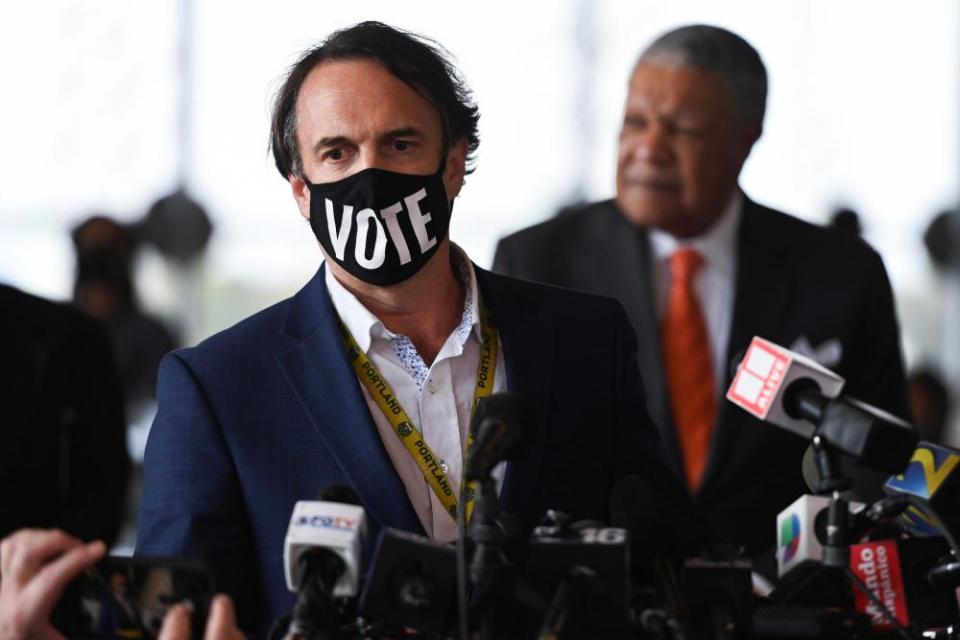Trump's lawsuits are diversionary tactic with little legal basis, experts say
With millions of votes waiting to be counted in the US presidential election, Donald Trump has effectively threatened to sue his way to re-election.
The president and his campaign has promised to bring the election to the supreme court, sued to halt vote-counting in several battleground states and requested a recount in another.
But at this moment, there is no evidence the campaign’s legal challenges will have a bearing on the election result under the law. Instead, the concern is how litigation plays in the court of public opinion, where the suggestion of fraud in one battleground state could cast doubt on the whole election.
Vanita Gupta, president and CEO of the Leadership Conference on Civil and Human Rights, said Americans should be confident their votes will be counted, but warned of Trump’s history of voting disinformation.
Related: Paths to US election victory: what Trump and Biden need to win
“The more desperate he may become, the more baseless allegations there are about the ways in which states count ballots, about our democratic process and his own authority over this process,” Gupta said.
Post-election litigation is normal. Lawsuits are always filed on election day and the days after in response to issues such as equipment malfunctions, printing errors and polls not opening on time.
Usually, they receive little attention. This year, they are under more intense scrutiny because the president has spent the year making frequent, baseless claims about election fraud.
For one of these routine cases to affect the outcome of the election, the ballots being contested would need to be both (a) big enough in number to determine the state’s result (for example, a suit which concerns 50,000 votes in a state a candidate won by 30,000 votes) and (b) in a state decisive for the election result.

As of Wednesday evening, election law experts said none of the lawsuits filed appeared to meet both these qualifications. “These case don’t seem to be very strong, they also don’t seem to be significant as a matter of votes,” said Paul Smith, vice-president for litigation and strategy at the Campaign Legal Center.
That could change as counting continues.
For now, the more significant cause for alarm is the Trump campaign’s actions on Wednesday as election results turned in Biden’s favor. Instead of waiting for a media outlet to call Pennsylvania, as is traditional, the campaign said Trump had won it despite the fact that 1 million votes were still waiting to be counted.
The campaign also announced it was suing to halt vote-counting in Michigan – which the Associated Press called for Biden – Pennsylvania and Georgia and that it would request a recount in Wisconsin, which the AP also called for Biden.
The first three challenges are unrealistic – most states count ballots until the results are certified two to three weeks after election day and ending the process is not something the court would consider seriously.
On Thursday morning, the Trump campaign sued alleging voter fraud in Nevada, claims that have already been struck down twice.
Hours before the Trump campaign filed the lawsuits against Michigan and Pennsylvania, the newly re-elected Senate majority leader, Mitch McConnell, said as much.
“Claiming you win the election is different from finishing the counting, and what we’re going to see in the next few days, both in the Senate races and the presidential race, is each state will ultimately get to a final outcome and you should not be shocked that both sides are going to have lawyers there,” McConnell said.
Late on Wednesday, the Trump campaign has filed the lawsuit seeking to pause the vote count in Georgia, where Biden was trailing Trump by one point. The Fulton county elections director said that they would finish counting votes on Wednesday, “whatever it takes”.

The Wisconsin recount is also unlikely to fall in the Trump campaign’s favor. Biden was more than 20,000 votes ahead of Trump and statewide recounts in elections from 2000 to 2015 resulted in an average margin swing of 282 votes, according to FairVote.
In response to the legal actions, Biden said: “Now every vote must be counted. No one is going to take our democracy away from us, not now, not ever. America has come too far.”
One reason an election-upsetting lawsuit has not emerged is because before the election, hundreds of lawsuits were filed to work out the inevitable kinks that would follow the dramatic increase in mail-in voting. This left fewer opportunities to challenge the process, because most issues had been tested in court.
One exception to this is in Pennsylvania, where there were more open questions about how mail-in votes would be processed. It is also one of the three states which wasn’t able to start processing absentee ballots until election day and it has an unresolved legal fight about whether mail-in ballots that arrive after election day should be counted. The Trump campaign also filed several lawsuits there on election day.
If the election comes down to Pennsylvania, this is a recipe for chaos. As of Wednesday night, Biden could win the electoral college without Pennsylvania.

This all followed Trump’s baffling early-morning proclamation that he would go to the supreme court to stop voting – which had already stopped. If one assumes he meant he would go to the nation’s highest court to stop ballot counting, that too is unlikely to work out.
Guy-Uriel Charles, a Duke Law School professor, said in a press call: “He certainly can’t just run to the US supreme court and file a suit there. That’s just not how our legal system operates.”
It is possible, but unlikely, one of the new legal challenges his campaign filed could end up in the supreme court. But that case would have to have a legal basis, be tried in a lower court, then appealed to the nation’s highest court, which would have to accept it. And for it to matter in the presidential race, it would have to meet the qualifications of affecting a large enough number of ballots in a decisive state.
Charles said: “But again, you can’t just walk into federal court and say, ‘I lost.’ You have to have a legal basis for saying a law has been violated.”
In reviewing the day in legal challenges, the election law expert Rick Hasen wrote that the Trump campaign’s moves could be done to slow the vote or be a last-minute attempt to capture one of the battleground states.
Hasen, a University of California, Irvine, professor, also echoed other legal experts’ concerns that the moves could simply be a disturbing effort to undermine Biden’s presidency, should he win.
“We always knew Trump would claim without evidence that fraud cost him the election,” Hasen wrote. “These suits let him pile up what might appear to some supporters as evidence but are actually unsupported assertions of illegality.”
